虚拟语气常见句型
英语-虚拟语气

Some Exercise
were 1. Even if he _______(be) here, he couldn’t solve the problem. were 2. He is playing the piano as if he _______ (be) Chopin. 3. He looks so happy as if hehad passed ________(pass) the exam already.
Some Exercise
had married 1. He would rather her___________(marry) a dog last year. didn’t go 2. I would rather you __________ (not go) there. stayed 3. I’d rather you ___________(stay) at home all day today. 4. I’d sooner you hadn’t done (do) yet. __________
5. ห้องสมุดไป่ตู้e insisted (坚决认为) that Tom broke _____(brake) the glass. was 6. His face suggested (表明) that he _____ angry.(be)
以lest, for fear that, in case引出从句
Some Exercise
1. He is not a pilot, but he wishes were he______ (be). had met 2. I wish I ___________(meet)him yesterday. would be 3. I wish it __________(be) fine tomorrow. had got up 4. If only I ___________(get up) early yesterday.
虚拟语气的八种情况

No.1虚拟语气的常见类型和句型(1)由wish引起的表示愿望的虚拟语气A.用wish表示对现在的愿望时,它所引起的宾语从句中谓语动词形式为:过去式(be动词用were)。
B.用wish表示对将来的愿望时,它所引起的宾语从句中谓语动词形式为:would, could, might+ 动词原形。
C.wish用于对过去的事实表示一种不可能实现的愿望时,宾语从句中的谓语动词形式为:had+动词过去分词或could, would + have +动词过去分词。
The picture exhibition bored me to death; I wish I had not gone to it.---“I let Joe borrow our radio for the afternoon.”---“That’s all right, but I wish he would buy one of his own.”I wish that he weren’t so lazy.(2)had hoped引起的宾语从句中备用语动词形式为would+动词原形,表示一种过去未实现的愿望或令人失望的事。
His father had hoped that his son would go to business with him, but his son became an artist later.(3)would (had) rather, would as soon, would sooner和would prefer所引起的从句中要求用过去式表示当时或将来的情况,用过去完成时表示过去的情况,表示希望或婉转的责备。
例如:I’d rather you posted the letter right away. 我倒希望你把这封信立刻寄出去。
I would prefer he didn’t stay there too long.我倒希望他不要在那儿可得太久。
常见的虚拟语气句型
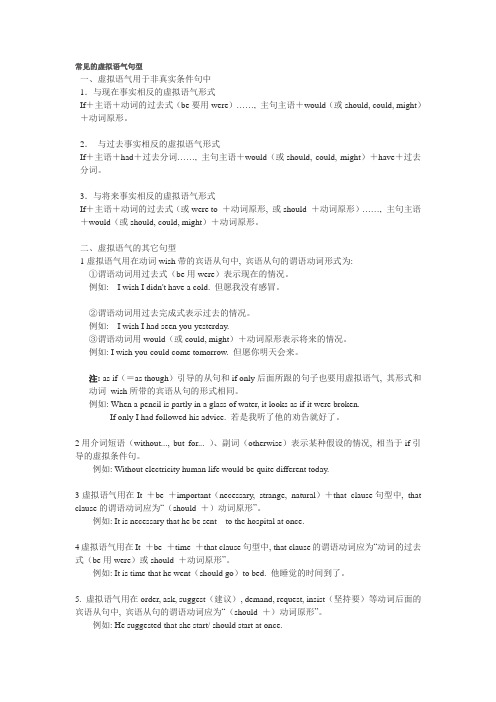
常见的虚拟语气句型一、虚拟语气用于非真实条件句中1.与现在事实相反的虚拟语气形式If+主语+动词的过去式(be要用were)……, 主句主语+would(或should, could, might)+动词原形。
2.与过去事实相反的虚拟语气形式If+主语+had+过去分词……, 主句主语+would(或should, could, might)+have+过去分词。
3.与将来事实相反的虚拟语气形式If+主语+动词的过去式(或were to +动词原形, 或should +动词原形)……, 主句主语+would(或should, could, might)+动词原形。
二、虚拟语气的其它句型1虚拟语气用在动词wish带的宾语从句中, 宾语从句的谓语动词形式为:①谓语动词用过去式(be用were)表示现在的情况。
例如: I wish I didn't have a cold. 但愿我没有感冒。
②谓语动词用过去完成式表示过去的情况。
例如: I wish I had seen you yesterday.③谓语动词用would(或could, might)+动词原形表示将来的情况。
例如: I wish you could come tomorrow. 但愿你明天会来。
注: as if(=as though)引导的从句和if only后面所跟的句子也要用虚拟语气, 其形式和动词wish所带的宾语从句的形式相同。
例如: When a pencil is partly in a glass of water, it looks as if it were broken.If only I had followed his advice. 若是我听了他的劝告就好了。
2用介词短语(without..., but for... )、副词(otherwise)表示某种假设的情况, 相当于if引导的虚拟条件句。
例如: Without electricity human life would be quite different today.3虚拟语气用在It +be +important(necessary, strange, natural)+that clause句型中, that clause的谓语动词应为“(should +)动词原形”。
虚拟语气15种句型PPT文档41页

谢谢你的阅读
❖ 知识就是财富 ❖ 丰富你的人生
71、既然我已经踏上这条道路,那么,任何东西都不应妨碍我沿着这条路走下去。——康德 72、家庭成为快乐的种子在外也不致成为障碍物但在旅行之际却是夜间的伴侣。——西塞罗 73、坚持意志伟大的事业需要始终不渝的精神。——伏尔泰 74、路漫漫其修道远,吾将上下而求索。——屈原 75、内外相应,言行相称。
2、要冒一次险!整个生命就是一场冒险。走得最远的人,常是愿意 去做,并愿意去冒险的人。“稳妥”之船,从未能从岸边走远。-戴尔.卡耐基。
梦 境
3、人生就像一杯没有加糖的咖啡,喝起来是苦涩的,回味起来却有 久久不会退去的余香。
虚拟语气15种句型4、守业的最好办法就是不断的发展。 5、当爱不能完美,我宁愿选择无悔,不管来生多么美丽,我不愿失 去今生对你的记忆,我不求天长地久的美景,我只要生生世世的轮 回里有你。
虚拟语气十大句型
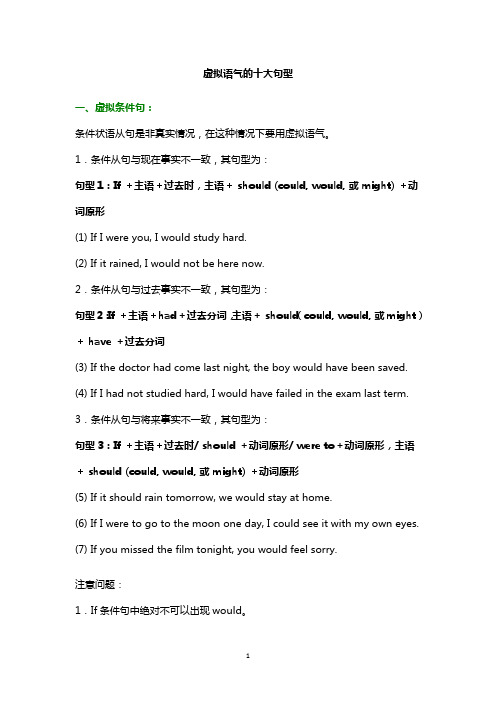
虚拟语气的十大句型一、虚拟条件句:条件状语从句是非真实情况,在这种情况下要用虚拟语气。
1.条件从句与现在事实不一致,其句型为:句型1:If +主语+过去时,主语+ should (could, would, 或might) +动词原形(1) If I were you, I would study hard.(2) If it rained, I would not be here now.2.条件从句与过去事实不一致,其句型为:句型2:If +主语+had+过去分词,主语+ should(could, would, 或might)+ have +过去分词(3) If the doctor had come last night, the boy would have been saved.(4) If I had not studied hard, I would have failed in the exam last term. 3.条件从句与将来事实不一致,其句型为:句型3:If +主语+过去时/ should +动词原形/ were to+动词原形,主语+ should (could, would, 或might) +动词原形(5) If it should rain tomorrow, we would stay at home.(6) If I were to go to the moon one day, I could see it with my own eyes.(7) If you missed the film tonight, you would feel sorry.注意问题:1.If条件句中绝对不可以出现would。
2.根据句中的时间状语,有时可能出现“混合虚拟”的情况,即主句可能是现在的情况,条件句也许是发生在过去的情况,但都要遵守上述句型。
如:(8) If you had studied hard before, you would be a college student now and you would graduate from a college in four years’ time.3.条件句中如果出现were, had, should可省去if,将主语与这些词倒装。
初中的解析虚拟语气的用法与句型

初中的解析虚拟语气的用法与句型解析虚拟语气是初中英语中的一个重要语法知识点,它表示一种与事实相反或不太可能实现的情况。
在语言表达中,虚拟语气经常用于表达建议、要求、命令、意愿、愿望、假设以及感叹等语境。
本文将通过解析虚拟语气的用法和常见句型,帮助初中学生更好地理解和运用虚拟语气。
一、虚拟语气的用法1. 虚拟语气用于表达与现在事实相反的情况。
例如:If I were you, I would study harder.如果我是你,我会更加努力学习。
2. 虚拟语气用于表示过去不可能实现的情况。
例如:He wishes he had bought that car.他希望自己当初买了那辆车。
3. 虚拟语气用于表达对现在或将来的建议、要求或愿望。
例如:I suggest that she go to bed early tonight.我建议她今晚早点睡觉。
4. 虚拟语气用于表示对过去行为的反悔、后悔或愿望改变。
例如:I wish I hadn't eaten so much dessert.我希望我没有吃那么多甜点。
5. 虚拟语气用于表示对某种假设或条件的情况下的想象。
例如:If I had a million dollars, I would travel around the world.如果我有一百万美元,我会环游世界。
二、虚拟语气的常见句型1. 条件句虚拟语气在条件句中,虚拟语气常常与过去时态连用。
例如:If I were rich, I would buy a big house.如果我有钱,我会买一栋大房子。
2. 祝愿句虚拟语气在表示祝愿的句子中,虚拟语气通常使用“wish”引导,后跟过去式或过去完成式。
例如:I wish I could go to the party with you.我希望我能和你一起去参加聚会。
3. 建议句虚拟语气在表示建议的句子中,虚拟语气通常使用“suggest”、“recommend”等动词引导,后跟从句的动词原形。
英语虚拟语气的用法和诀窍

虚拟语气15种句型
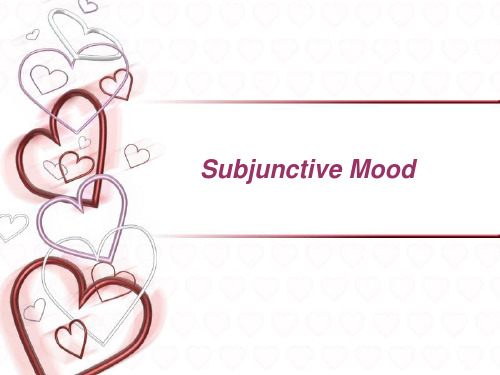
3.as if / as though后的表语或状语从句 (与wish相同)
含义 动 词 形 式
例句
现在 did / were
He looks as if he knew the little girl.
过去 Have done
It appeared as if nothing had
happened.
5.动词形式为(should)+do 的虚拟
2. It’s + adj.+that 的主语从句 (adj: necessary / essential/
important / natural / strange / possible / impossible
eg. It is important that we should attend the meeting.
• 对过去的猜测 • 肯定 must have done • 否定 can / could not have done • 可能 may / might have done
• 本应该做(实际没有做,有责备意思) • should have done • shouldn’t have done • 本来有必要作(实际没有做,不含责
desire 命令:order / command/ 坚持:insist 不管是动词还是名词,不管是主动还是被动
,不管是引导主语从句, 宾语从句, 表语 从句还是同位语从句, 都要用(should) do
5.动词形式为(should)+do 的虚拟
• My suggestion is that we should listen to his opinion first.
It is time that we stopped work and went home.
高中英语虚拟语气句型

常见的虚拟语气句型1.if条件句条件状语从句可分为真实条件句,即条件满足,事实就发生的情况;和非真实条件句,即与事实相反或难以实现的假设情况。
虚拟语气的基本句型,即是这If I had got up early, I wouldn’t have been late.If I were to do it, I should do it at once.【说明】①在非正式英语中,条件从句中的第一、第三人称单数主语后可用was代替were。
If I was you, I would accept the invitation.②主句中的would可用于各种人称,而should只用于第一人称。
③在主句中也可用情态动词could,might代替would,should。
If I had had enough time, I might have done it better.④条件从句中的谓语动词含有were,had,should时,可以省略从属连接词if,然后采用倒装结构,把were,had,should移到主语前面。
Should you pass this way, do drop in for a visit.= If you should pass this way,……Had I known it, I wouldn’t had made such a silly mistake.= If I had known it,……Were it left to me to decide whether I should have a job immediately or go on to study at college, I wouldn’t hesitate a moment to choose the latter.= If it were left to me to decide……..⑤在同一个句子中不能一部分表示真实条件,另一部分表示非真实条件。
高中英语虚拟语气的十大句型

高中英语虚拟语气的十大句型虚拟条件句:条件状语从句是非真实情况,在这种情况下要用虚拟语气。
1.条件从句与现在事实不一致,其句型为:句型1:If +主语+过去时,主语+should (could, would, 或might) +动词原形(1) If I were you, I would study hard.(2) If it rained, I would not be here now.2.条件从句与过去事实不一致,其句型为:句型2:If +主语+had+过去分词,主语+should(could, would, 或might)+have +过去分词(3) If the doctor had come last night, the boy would have been saved.(4) If I had not studied hard, I would have failed in the exam last term.3.条件从句与将来事实不一致,其句型为:句型3:If +主语+过去时/ should +动词原形/ were to+动词原形,主语+should (could, would, 或might) +动词原形(5) If it should rain tomorrow, we would stay at home.(6) If I were to go to the moon one day, I could see it with my own eyes.(7) If you missed the film tonight, you would feel sorry.注意问题:1.If条件句中绝对不可以出现would。
2.根据句中的时间状语,有时可能出现“混合虚拟”的情况,即主句可能是现在的情况,条件句也许是发生在过去的情况,但都要遵守上述句型。
如:(8) If you had studied hard before, you would be a college student now and you would graduate from a college in four years’time. 3.条件句中如果出现were, had, should可省去if,将主语与这些词倒装。
虚拟语气15种句型总结
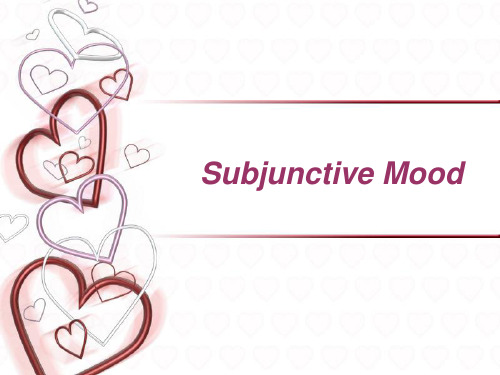
C.didn’t hurt; would go
D.didn’t hurt; would have gone
17 21 19
2.wish 后的宾语从句 = if only
含义
动词形式
对现状 表达愿望 Did / were
对过去表示 遗憾/后悔
Had done
例句
I wish I had a little lab of my own.
备意思)
• Need have done • Needn't have done
Practice
1. If I _k_n_e_w__ (know) her address, I would write to her. 2. What would you have done if you _h_a_d__m__is_s_e_d(miss) the train? 3. If he h__a_d_n_o_t_b__ee_n_ il(lnot be ill ), he would have done something. snows 4. If itw__er_e__to__/s_h_o_u_l_d__sn_o_w__/_s_n_o_w_e_d(snow) tomorrow, we _sh__o_u_ld__g_e_t_u_p_(get up) early.
• My suggestion that we should listen to his opinion first is being discussed.
• 注意当insist—硬说,suggest—表明, 不能有虚拟语气。
5.动词形式为(should)+do 的虚拟
2. It’s + adj.+that 的主语从句 (adj: necessary / essential/
虚拟语气的用法与句型

虚拟语气的用法与句型虚拟语气是指在句子中表达一种假设、愿望、建议、命令等非真实情况的语气。
它在表达的内容上与现实相悖,用于描述与实际情况相反或与现在事实相反的假想情况。
虚拟语气在汉语中分为虚拟条件和虚拟假设两种情况。
本文将详细介绍虚拟语气的用法和常见句型。
一、表示假设的虚拟条件句型1. 如果引导的条件句条件句使用“如果+主语+动词”的结构,表示与实际情况相反的假设。
举例:如果我会飞,我就飞到天空中。
如果你能去,我们就一起去旅行。
如果明天下雨,我就不去跑步了。
2. 要是引导的条件句条件句使用“要是+主语+动词”的结构,表示与实际情况相反的假设。
举例:要是你在这里,我就不会感到孤单。
要是他努力学习,他就可以考上大学。
要是明天放假,我就会去看电影。
3. 假如引导的条件句条件句使用“假如+主语+动词”的结构,表示与实际情况相反的假设。
举例:假如我是你,我就不会这样选择。
假如我有足够的时间,我就会旅行。
假如天气好,我们就可以去海边玩。
二、表示愿望的虚拟条件句型1. 祈使句+“但愿(希望)”句型使用祈使句来表达对未来情况的愿望,后接“但愿(希望)”引导的句子,表示非真实情况的愿望。
举例:多带雨伞,但愿今天不下雨。
早点回家,但愿家里没人。
努力学习,但愿能考好成绩。
2. 希望/愿望+“(能)+动词原形”使用希望或愿望来表达对未来情况的期望,后接能否+动词原形,表示非真实情况的愿望。
举例:我希望明天不下雨。
我希望他能来参加我的生日派对。
我希望你明天能早点到公司。
三、表达建议的虚拟条件句型1. 建议/要求/命令+“(应该)+动词原形”使用建议、要求或命令来表达对他人的建议,后接“应该”引导的句子,表示非真实情况的建议。
举例:你应该多锻炼身体,这样会更健康。
你应该早点睡觉,这样明天才能精神饱满。
上班迟到是不对的,你应该注意时间。
2. 要是/如果+动词过去式使用要是或如果来引导一个非真实情况的条件句,表示一种建议或建议的情感色彩。
虚拟语气
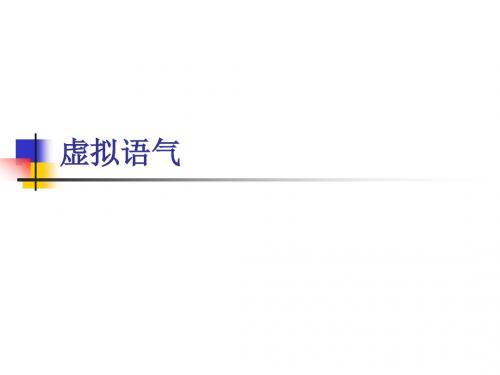
It is
that
(should) do
Examples:
It is suggested that we (should) protect our environment. 我们该保护环境了。 It is necessary that we protect our environment. 我们必须保护环境了。 It is a pity that you (should) miss it again. 真可 惜你又错过了。 It is insisted that he do his homework by himself.
历届真题详解
5. I think it’s high time we _______ strict measures to stop pollution. (02.12.A) A) will take B) take
C) took
D) have taken
6. He talked as if he (do) ________ all the work himself, but in fact Tom and I did most of it. (2001.1.B级)
虚拟语气
一、概述
虚拟语气(Subjunctive Mood)这一语 法项目几乎是二级必考的内容
虚拟语气是一种特殊的动词形式,用来 表示说话人所说的话并不是事实,而是 一种假设、愿望、怀疑、建议或推测。 常见的虚拟语气类型:
1.If引导的非真实条件句
A.与现在事实相反的假设
主句 would (should)等 +动词原形
2. wish引导的宾语从句
虚拟语气
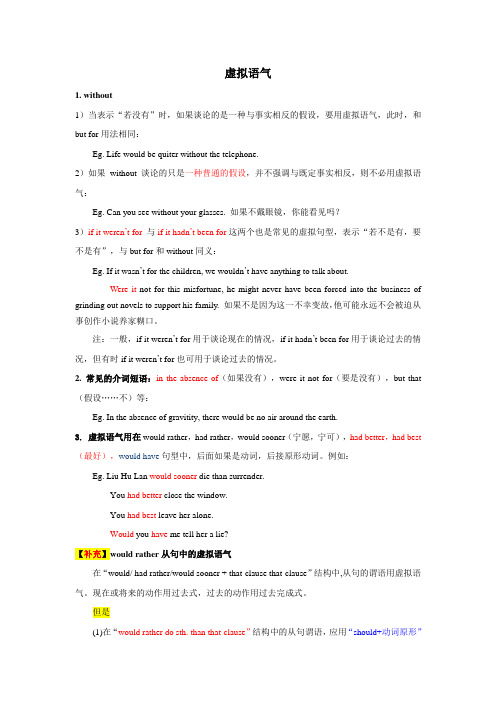
虚拟语气1. without1)当表示“若没有”时,如果谈论的是一种与事实相反的假设,要用虚拟语气,此时,和but for用法相同:Eg. Life would be quiter without the telephone.2)如果without谈论的只是一种普通的假设,并不强调与既定事实相反,则不必用虚拟语气:Eg. Can you see without your glasses. 如果不戴眼镜,你能看见吗?3)if it weren’t for与if it hadn’t been for这两个也是常见的虚拟句型,表示“若不是有,要不是有”,与but for和without同义:Eg. If it wasn’t for the children, we wouldn’t have anything to talk about.Were it not for this misfortune, he might never have been forced into the business of grinding out novels to support his family. 如果不是因为这一不幸变故,他可能永远不会被迫从事创作小说养家糊口。
注:一般,if it weren’t for用于谈论现在的情况,if it hadn’t been for用于谈论过去的情况,但有时if it weren’t for也可用于谈论过去的情况。
2. 常见的介词短语:in the absence of(如果没有),were it not for(要是没有),but that (假设……不)等:Eg. In the absence of gravitity, there would be no air around the earth.3. 虚拟语气用在would rather,had rather,would sooner(宁愿,宁可),had better,had best (最好),would have句型中,后面如果是动词,后接原形动词。
虚拟语气讲义(15个句式)

虚拟语气讲义1.虚拟语气句型1If + were/ did/ (动词的过去式), 主语+would/ might/ should / could + do 。
(表示对现在的假设)eg. If I were you, I would not be so proud . 如果我是你,我不会如此自负.eg. I don’t have a cellphone. If I had one , it would be convenient for me to get in touch with others 我没有手机,如果我有手机的话,和别人联系就方便的多了。
eg. If I were in your position, I would think better of it .如果我处在你现在的境地,我会重新考虑然后放弃。
2. 虚拟语气句型2If + had done, 主语+would/ might/ should / could + have done表示对过去或已经发生事情的虚拟假设。
eg. What a pity it is that you didn’t attended the concert yesterday! If you had attended the concert, you would have seen the famous singer.真遗憾你昨天没有去听音乐会。
如果你去了,你就会见到那位名歌手。
eg. Anyone in his position would have done the same= If anyone had been in his position, he would have done the same.3. 虚拟语气句型3If + were/ did(动词过去式)/should/ were to do , 主语+would/ might/ should / could + do (表示对将来的假设).eg. If he should refuse (= if he were to refuse = if he refused ), it wouldn’t matter万一他拒绝了. 那也没有什么关系.eg. If you shouldn’t pass the college entrance e*amination, what would you do"万一你高考不中,你该怎么办?4. 虚拟语气条件句的倒装在虚拟条件句中,如果出现有were, had, should,可省去if,可将主语与这些词倒装,构成虚拟倒装句。
虚拟句型结构及用法
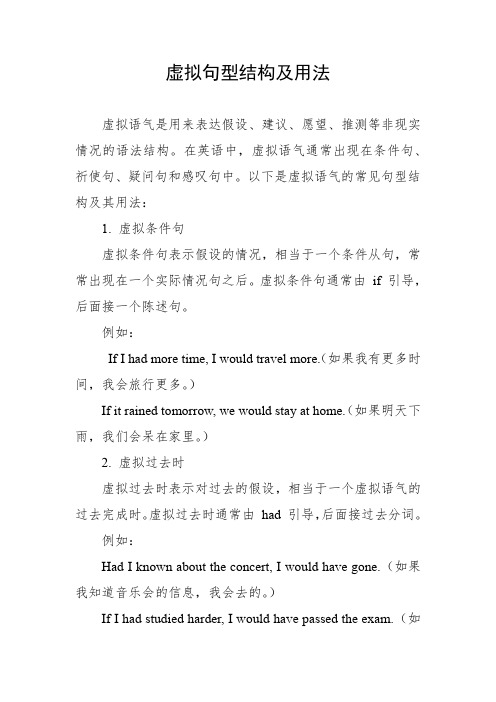
虚拟句型结构及用法虚拟语气是用来表达假设、建议、愿望、推测等非现实情况的语法结构。
在英语中,虚拟语气通常出现在条件句、祈使句、疑问句和感叹句中。
以下是虚拟语气的常见句型结构及其用法:1. 虚拟条件句虚拟条件句表示假设的情况,相当于一个条件从句,常常出现在一个实际情况句之后。
虚拟条件句通常由if 引导,后面接一个陈述句。
例如:If I had more time, I would travel more.(如果我有更多时间,我会旅行更多。
)If it rained tomorrow, we would stay at home.(如果明天下雨,我们会呆在家里。
)2. 虚拟过去时虚拟过去时表示对过去的假设,相当于一个虚拟语气的过去完成时。
虚拟过去时通常由had 引导,后面接过去分词。
例如:Had I known about the concert, I would have gone.(如果我知道音乐会的信息,我会去的。
)If I had studied harder, I would have passed the exam.(如果我学习得更努力,我会通过考试的。
)3. 虚拟将来时虚拟将来时表示对将来的假设,相当于一个虚拟语气的将来时。
虚拟将来时通常由should 或were to 引导,后面接动词原形。
例如:Should I go to the party?(我应该去参加聚会吗?)If she were to call me, what would I say?(如果她给我打电话,我会说些什么?)4. 虚拟祈使句虚拟祈使句表示对过去或将来的建议、命令或请求。
虚拟祈使句通常由should 或were to 引导,后面接动词原形。
例如:Should I go to the doctor?(我应该去看医生吗?)If I were to ask him, what would he say?(如果我问他,他会怎么说?)5. 虚拟感叹句虚拟感叹句表示对假设的情况的感叹。
英语语法:三个常考虚拟语气句型

英语语法:三个常考虚拟语气句型一、句型介绍这两个句型是If it weren’t for…和If it hadn’t been for…,这是两个很常用的虚拟语气句型,也经常受到命题人的青睐,其意为“若不是(有)”“要不是有”。
如:If it weren’t for water, no plant could grow. 要是没有水植物就无法生长。
You wouldn’t be anywhere if it weren’t for Ruth. 若不是有鲁思你不会有任何成就。
If it hadn’t been for the doctor, he would have died.要不是医生救了他,他就会死了。
If it hadn’t been for Mary, I might not have understood. 要不是有玛丽,我可能还不理解。
二、与but for, without等替换这两个句型有时可用but for, without等替换。
如:要不是有你帮忙,我们是不会成功的。
If it hadn’t been for your assistance we wouldn’t have succeeded.=But for your assistance we wouldn’t have succeeded.=Without your assistance we wouldn’t have succeeded.三、时间上的同与异原则上说,if it weren’t [wasn’t] for 用于谈论现在的情况,而if it hadn’t been for 用于谈论过去的情况。
但实际上if it weren’t [wasn’t] for有时也可用于谈论过去的情况:If it weren’t for their help, we couldn’t have got over the difficulties. 要不是他们协助,这些困难我们是克服不了的。
虚拟语气

虚拟语气句型 1 (与现在事实相反)在条件句中用虚拟语气是表示对现在情况的假设,是一种非真实条件句。
句型:If +主语did (were)…,主语would do …主句中除了would之外,还可用情态动词could, might, should.If I were you, I would (could, might, should) help him.虚拟语气句型 2 (与过去事实相反)句型2是对过去情况的假设,表示与过去事实相反的条件和结果。
句型:If 主语 had done,主语 +would have done虚拟语气句型 3 (与将来事实相反)句型3是对将来情况的假设,表示与将来事实相反或可能相反的条件和结果。
句型:If +主语were to / should + 动词原形…,主语woulddo…虚拟语气句型 4 (错综时间虚拟条件句)有时条件从句和主句所表示的动作在时间上可以不一致(例如一个与过去事实相反,另一个与现在事实相反),这种虚拟条件句就称为错综时间虚拟条件句。
在这种条件句中,动词的形式要根据具体情况进行调整。
例句:She would never have behaved like that if she had some common sense.如果她有一些常识的话,她就决不会像那样做了。
If he had listened to me, he would not be in such trouble now.如果他听了我的话,他现在就不会有这样的麻烦。
If I had a bike (now), I would have lent it to you yesterday.假如我有自行车,昨天早就借给你了。
If you had not studied the problem carefully, you would find difficulty now.如果当初你没有认真研究这个问题,现在你就会遇到困难。
- 1、下载文档前请自行甄别文档内容的完整性,平台不提供额外的编辑、内容补充、找答案等附加服务。
- 2、"仅部分预览"的文档,不可在线预览部分如存在完整性等问题,可反馈申请退款(可完整预览的文档不适用该条件!)。
- 3、如文档侵犯您的权益,请联系客服反馈,我们会尽快为您处理(人工客服工作时间:9:00-18:30)。
1.对过去的虚拟If sb. had done sth, sb. would have done sth
2.对现在的虚拟If sb. did sth, sb. would do sth
3.对将来的虚拟If sb. did sth, sb. would do sth
If sb. were to do
sth, sb. would do sth
If sb. should do sth, sb. would do sth
4.错综虚拟条件句(if+过去完成时, sb. would do sth)
If the doctor had come sooner last
night, Tom would be alive today.
If you had studied hard at that time, you would be a key university student now.
5.虚拟条件句,从句可以省略if,
但谓语动词要部分倒装.
6.含蓄虚拟条件句标志性词汇: without (如果没有), but for (要不是), otherwise/or (否则)
***if条件句可以与without/but
for互相转换,意思相同。
7.表示建议\要求\命令等动词以及相应的名词引导的名词性从句,通常跟should结构. Insist/suggest/ad vise/command/or der/urge/recomm
end/require/requ est/propose that sb. should do sth ***insist做“认为”讲时,相当于think, 不用should结构. Suggest 做“暗示,表明”讲时,相当于imply, 不用should结构.
8.常见的should 结构句型
It’s
necessary/natura l
/probable(很可能)/
should do sth
It is a pity/ a shame/ no wonder that sb. should do sth. 9.wish+宾语从句,要用虚拟语气.
Wish that sb. had done sth (对过去虚拟) Wish that sb. did sth (对现在虚拟) Wish that sb. would do sth (对将来虚拟) 10.would rather 后的虚拟语气只有两种句型:
would rather sb. did sth
(对现在和将来虚拟)
would rather sb. had done sth (对过去虚拟) 11.If only…! (虚拟语气)
12.as if/ as though如果表
示与事实相反的情况,要用虚拟语气.
…as if sb. did sth (对现在虚拟) …as if sb. had done sth
(对过去虚拟) …as if sb. would do sth
(对将来虚拟)
13.It is high/about time+虚拟语气It is high/about time that sb. did sth.
It is high/about time that sb. should do sth (不能省略)。
